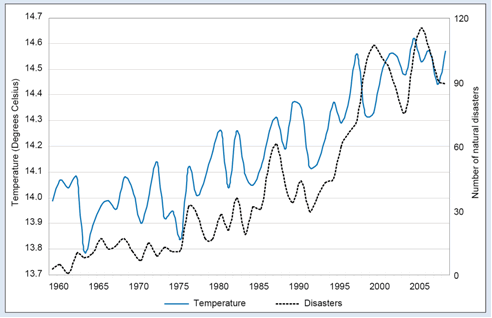| EMBARGO The contents of this press release and the related Report must not be quoted or summarized in the print, broadcast or electronic media before 25 November 2010,17:00 [GMT] (12:00 New York; 18:00 Geneva, 22:30 New Delhi, 02:00 - 26 November 2010 Tokyo) |
Says challenges facing LDCs are unprecedented
Geneva, 25 November 2010 -- The world´s 49 poorest countries need more and better-designed financing -- rising from an estimated $4 billion to $17 billion per annum by 2030 -- to cope with the difficulties posed by climate change, an UNCTAD report says. The report says it has been estimated that "for every 1?C rise in average global temperatures, annual average growth in poor countries could drop by 2-3 percentage points, with no change in the growth performance of rich countries". It contends that, because of their lack of social and physical infrastructure, inadequate institutions, and narrow economic bases, least developed countries (LDCs) may be exposed not just to potentially catastrophic large-scale disasters, but also to a more permanent state of economic stress as a result of higher average temperatures, reduced availability of water sources, more frequent flooding, and intensified windstorms.
The Least Developed Countries Report 2010(1), released today, is subtitled "Towards a new international development architecture for LDCs". The report urges that climate change adaptation and mitigation should be one of the five central pillars of a new international architecture to support LDCs. (See press release 3.) It cautions that, while LDCs have historically contributed few of the greenhouse gas (GHG) emissions that are now changing the global climate -- and while they currently contribute only 1 per cent of such emissions -- they face much greater economic and literal damage from climate change effects than do long-industrialized countries.
Climate change will be one of the major issues discussed at the Fourth United Nations Conference on Least Developed Countries (LDC-IV), which is scheduled for 2011 in Istanbul.
In particular, LDCs lack the resources to respond to the more frequent natural disasters such as droughts, floods, and severe storms that are predicted from climate shifts, and which already are striking more often, the study says. (See figure below.)
The report finds that there has been an increase in the frequency and intensity of extreme weather events in LDCs, with five times as many such incidents occurring from 2000 to 2010 as during the 1970s. During the period 2000-2010, LDCs recorded economic losses totalling $14.1 billion. Within the LDC Group, Bangladesh and Myanmar suffered the greatest economic losses ($5.8 billion and $4.5 billion respectively). Overall, LDCs and small island developing States (SIDS) are among the most susceptible in the world to natural disasters, as a result of which they suffer significant shocks to their economies.
Up-front financing for climate change responses is urgently needed, the study contends. While the private sector will have an important role to play, the report notes, private sources cannot deliver such initial funding in sufficient amounts.
The study says the climate finance funds could be used for climate-proofing existing infrastructure; additional investments to cope with climate change (for example, for dams, dykes, etc); meeting the costs of community-based adaptation (for example, by improving communities´ capacities to respond to climate-caused emergencies); and mainstreaming adaptation into national Poverty Reduction Strategy Papers (PRSPs) and government policies.
For example, the Strengthening Climate Resilience and Reducing Disaster Risk in Agriculture to Improve Food Security in Haiti post-Earthquake Least Developed Country Fund (LDCF) project focuses on seeds, cropping patterns, cultivars and improvements to traditional adaptation practices that promote climate resilience. In addition to the January 2010 earthquake, Haiti has been disproportionately affected by the impact of natural disasters such as flooding and hurricanes.
Data from the Organization for Economic Cooperation and Development (OECD) show that LDCs as a group received $358 million in climate change-related (mainly greenhouse gas emissions reduction) official development assistance (ODA)(2) in 2008. That is only 0.8 per cent of overall development assistance provided LDCs in 2008, the report says. It stresses that the costs of adapting to and mitigating climate change effects will be much greater than this total amount. Developed countries have made specific commitments to increasing climate change-related financing and to promoting relevant technology transfer to LDCs. These specific commitments must be "new and additional" to existing financing flows, the report says; they should not be conflated with existing ODA flows.
The LDCF is the main source of LDC climate adaptation finance provided through the United Nations Framework Convention on Climate Change (UNFCCC) Global Environmental Facility. As of May 2010, 22 donors had pledged contributions to the LDCF equivalent to $221.5 million. The total amount deposited was $169.1 million. The funds are insufficient to meet the adaptation needs of the LDCs, the report says.
There is also a need for strong national policies, including regulatory, macroeconomic and fiscal (subsidies), front-loaded investment, and effective planning. Climate adaptation and mitigation finance should also be aligned with national development strategies and foster country ownership, the report recommends.
In the area of climate change, the report calls for urgent and adequate financing of the LDC Fund, and improved access for LDCs to the UNFCCC´s Clean Development Mechanism (CDM) as a means of overcoming the financial barriers that prevent LDCs´ access to renewable energy technology.
It says a link between climate change policy and overall development strategies for LDCs is crucial.
Overview in French [52 pages, 1204 KB]
Overview in Spanish[60 pages, 1572 KB]
Overview in Russian[58 pages, 1649 KB]
ANNEX
Tables and figures
World temperature and natural disasters in LDCs, 1960-2009
Source: Goddard Institute for Space Studies (GISS), NASA GISS Surface Temperature Analysis (GISTEMP) (http://data.giss.nasa.gov/gistemp/); and UNCTAD secretariat estimates, based on EM-DAT: The OFDA/CRED International Disaster database (www.emdat.net), Université catholique de Louvain, Louvain-La-Neuve.
Note: Sample comprised of 47 LDCs.



